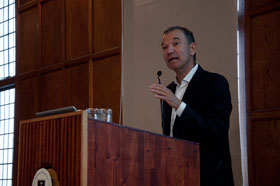Negotiating Wonder and Taint

'My deep, ongoing interest is in the relation between literature and history, the process through which certain remarkable works of art are at once embedded in a highly specific life-world and seem to pull free of that life-world. I am constantly struck by the strangeness of reading works that seem addressed, personally and intimately, to me, and yet were written by people who crumbled to dust long ago,' says Greenblatt, who has written extensively on Shakespeare, the Renaissance, culture and new historicism, which he often refers to as 'cultural poetics'.
The discussion with Carolyn Hamilton, Mbongiseni Buthelezi and Sandra Youngtook off from the suggestion that revisiting Greenblatt's 1991 publication, Marvelous Possessions: The Wonder of the New World (University of Chicago Press) might offer contemporary researchers an opportunity to reassess the world's inheritance of European writings about non-literate societies, accumulated across four hundred years.
The audience was urged to consider the legacy in the contemporary world of a vast body of writing, some of it published, other parts contained in archives, of European representations of non-literate peoles of the so-called New World, later the colonies of Europe. In the two decades since the publication of Marvelous Possessions, travel writing, colonial ethnography, eye/I-witnessing and the critique of colonial power relations have been the subjects of countless academic publications.
European writings about the inhabitants of the New World and the subsequent colonies are today seldom read as factual reporting. In South Africa much scholarship has been devoted to revealing colonial fantasies, which writings of this nature entail, the contaminations of indigenous practices and ideas for which they are responsible and the violence which they involve. Yet, closer reflection on the particular historical circumstances of their original production and on their changing take-up over time has the potential to reveal encounters more complex than is encompassed by contamination and violence.
Greenblatt asserted that it is important not to dismiss sources on an ideological basis. 'The world is full of monsters who have left behind very interesting traces in the archive,' he said. In his research into the 16th century this has entailed grappling intensively with the testimonies of interrogators, despite their obvious biases.
He described his relationship to archive as 'weird, accidental and palliative'. Unlike 'serious historians', Greenblatt said he consciously embraces 'a random turning of the pages', trusting that something will 'leap out' at him 'seizing' his interest and establishing a 'frisson' of intellectual excitement, which he has always deemed worthy of exploring. He unabashedly affirmed the subjectivity of archival pursuits, saying that that elements of surprise and randomness are key to the individual care and attraction he brings to his own archival investigations.
He described how an innate trust of his intense curiosity had led to unexpected insights leaping forth from the archive, allowing it to become more than a mute 'accumulation of representations' left to us by history. This irregular mode might not be the 'respectable' way to approach archival material, he said, but it does constitute a 'valid base for hermeneutical interpretative enterprises'.
Meanwhile Buthelezi, a literary scholar who is exploring the use of praise poetry by formerly subjugated peoples to imagine their pasts, said he found archival work 'frustrating' and 'alienating' in its incapacity to take him back to the pre-colonial era that charges his interests. He posed the question: 'Is it possible to somehow get outside of the archive to imagine the ways in which the people Columbus encountered may have reacted to the encounter? Is it at all possible to get outside of Columbus's representations?'
'Research will never give you the full unmediated voice you desire,' said Greenblatt in response. 'But that should not stop you from seeking it.'
In his lecture the previous evening at Hiddingh Hall, Greenblatt took a rapt audience on a journey across the centuries, as he gave us a heady whirlwind tour of his latest book The Swerve: How the World Became Modern,which was published this year. In it he charts the riveting tale of how the last surviving manuscript of an ancient Roman philosophical epic survived the so-called Dark Ages to be uncovered on a library shelf nearly six hundred years ago by a short, genial, cannily alert man who saw with excitement what he had discovered and ordered that it be copied.
That book was On the Nature of Things by Lucretius- a beautiful poem of the most dangerous ideas: that the universe functioned without the aid of gods, that religious fear was damaging to human life, and that matter was made up of very small particles in eternal motion, colliding and swerving in new directions.
The copying and translation of this ancient book - the greatest discovery of the greatest book-hunter of his age - fueled the Renaissance, inspiring artists such as Botticelli and thinkers such as Giordano Bruno; shaped the thought of Galileo and Freud, Darwin and Einstein; and had a revolutionary influence on writers such as Montaigne and Shakespeare and even Thomas Jefferson.
Listening to Greenblatt speak, it wasn't hard to imagine why his many honours include the Mellon Distinguished Humanist Award, two Guggenheim fellowships and memberships of The American Academy of Arts and Sciences, the American Philosophical Society and the American Academy of Arts and Letters.